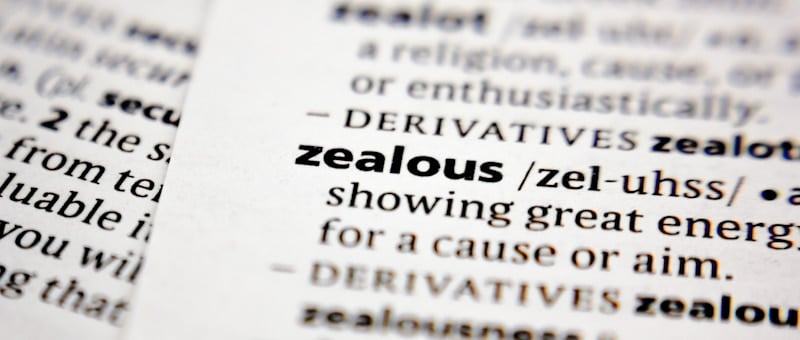Certain words in the English language might have a remarkably similar spelling and sound to them, but they could still mean completely different things – for instance, “zealous” and “jealous”. And if you add a few more letters to any existing word, the newly formed word could take a completely new avatar – like “zeal” and “zealotry”. When using such words in sentences, it’s not that difficult to interchange their meanings or confuse one word for another.
To properly use the word “zealous” in a given sentence, use it as an adjective to describe someone’s strong support or excitement for something. The surrounding sentences should help to provide context for the zealousness of your subject.
Keep reading to learn the meaning of “zealous” in greater detail, the contexts in which it could be used, how it is not the same as similar-sounding words, etc.

Zealous – Definition
The word “zealous” is the adjective form of the noun “zeal”, which means “eager partisanship”. “Zealous” means feeling or exhibiting energetic and strong support for a certain individual, occurrence, cause, etc. Generally, people who believe in something wholeheartedly lend their zealous or strong support. People with deep-seated support, love, or passion for a sports team, religion, group, cause, etc. are all zealous people.
How to Properly Use “Zealous” In A Sentence
Generally, the term “zealous” can be used to frame certain types of sentences, such as the following:
- Basic Sentence
A simple or basic sentence containing the word “zealous” will have a subject and a verb, besides having modifiers and an object. However, there will be just one independent clause.
- Compound sentence
A compound sentence with the word will have two independent clauses, at least. The two clauses could be merged with a coordinating conjunction and a comma or a semicolon.
- Complex sentence
A complex sentence will contain a minimum of one independent and a dependent clause. A dependent clause could denote the independent clause’s subject (which, who) or time/sequence (while, since), or causal elements (if, because).
- Compound-complex sentence
Sentence types could be merged. A compound-complex sentence combo containing the term “zealous” will have a minimum of two independent clauses and one dependent clause (at least).
The sentence structure aside, and as mentioned above, knowing what words should be used with “zealous” can significantly help with structuring sentences with the word.
Words often used before “zealous” include:
- a
- and
- the
- more
- most
- of
- his
- so
- of
- were
- very
Words that typically come after the term are:
- and
- in
- for
- of
- to
- advocate
- friend
- than
- efforts
Often, the term may also be the last word in a sentence or end with a period (.).
Since “zealous” is an adjective, it’s highly likely to be followed by a noun, which most likely are:
- Goliath
- Puritan
- moderation
- reformer
- Protestantism
- Orthodoxy
- devotion
- preacher
- supporter
- royalist
Kindly note, the aforementioned nouns are just a few from the hundreds and thousands of nouns that could immediately follow “zealous” in a sentence.
Negative Undertone
“Zealous” is not entirely a positive term. It has, at times, negative connotations. And that primarily depends on how the word gets used in sentences. Not to mention, the term “overzealous” tips the scale a bit too much to the negative side. In other words, being too zealous may do more harm than good.
For example, if you are an “overzealous” supporter of a political party, you may not be able to see the faults or drawbacks of the party you endorse. Also, you won’t see the good things rival or other parties bring to the table.
Here are a few sentences that demonstrate how the term “overzealous” is incorporated to describe negative or unfavorable contexts or situations:
- The town perceived the orders as “unnecessary meddling” by the overzealous leader and the state bureaucracy.
- Joel was not happy about the press always calling him out for his attention to details, by misinterpreting it as “overzealousness“.
- People in the region have been undone by decades of overzealous firefighting.
When “zealous” feelings or beliefs go overboard or could be conceived as “fanaticism”, it’s called “zealotry” – the adjective form of the word “zealot”.

Difference Between “Zealous” And “Jealous”
The terms “zealous” and “jealous” sound similar and also have almost identical spelling. Both words, in fact, are based on the same Latin word. The root word of “zealous” is “zelosus”, which means “full of zeal”. Though “jealous” is primarily based on the French word “jalousie”, it also partially borrows from “zelosus”.
Despite sounding the same and based on the same root-word, the meanings of “zealous” and “jealous” are not the same.
A “jealous” person is afraid or insecure about someone better than them. They are overly envious of or possessive about people. Also, they are likely to be suspicious of unfaithfulness. A zealous individual, on the flip side, is passionate, enthused, and dedicated to a certain cause or thing – which are relatively good traits to have.
The following sentences should give you a clear picture of the contexts in which “jealous” is used:
- His jealous looks annoyed me.
- She has no reason to feel jealous of me.
- What made the woman act jealous when she had no reason to be so?
- Martha was never the jealous kind, but then love changed her.
- I know you are jealous of him, but what you did to him is disgusting and cannot be justified.
Though the two words are almost poles apart with regard to their meanings, there are instances when both words get used in the same sentence. Here is a sentence demonstrating the same:
- A jealous individual could feel bitter about another person who puts in zealous efforts to do well in life.
If you think you may get confused between the two words or interchange them while writing, remember that “zealous” is based on “zeal”, a proper word, while “jeal” is not a valid English term.
Here are sentences that incorrectly use “zealous” and “jealous”:
- A leader who gets zealous by their followers is unlikely to inspire or command loyalty.
- The jealous organizations have continually inspired them to supervise the quality of care offered to the elderly in the institution.
Example Sentences With The Word “Zealous”
Here are sentences using the word “zealous”:
- The zealous protestors tearing down the fence came as a surprise to nobody.
- The zealous cop hunted for the accused relentlessly.
- When the missionary talks about her zealous religious beliefs, enthusiasm oozes out of her.
- Several zealous fans were wearing face paint.
- Carl is a zealous lawyer who goes the additional mile to defend his clients.
- The zealous environment activist chained herself to the large trashcan to bring people’s attention to all the littering in the area.
- The zealous philanthropist contributed two million dollars to the charity.
- At noon, he headed to the kitchen to unleash the zealous cook within him.
- They all borrow from the legacies their zealous ancestors left behind.
- He was a preacher and the most zealous minister the local people ever had.
- A zealous bonding to these duties would ensure private and public esteem.
- She is my zealous disciple.
- No one was as zealous as Pete in lending support to the proposal.
- Only her most zealous followers came out in support of the new tax bill.
- No zealous proponent of good citizenship will argue that participation in politics must be pursued at the cost of forgoing all other obligations.
- Mohammad was a zealous patriot and served his nation to the best of his abilities as a soldier.
- A fresh breed of ideologically-driven, zealous young activists established themselves within the party.
- The arguments could seem quite rational, but they are equally zealous too.
- Modern-day lawyers interpret zealous representation as doing whatever their clients want.
- Fr Julian was known for being a devout and zealous pastoral priest.
Are People Born With Zeal?
People are not zealous by birth. The things that happen in their lives, the individuals they meet, the circumstances they live and grow in, etc. make them develop a zeal for certain things or causes. This also means it’s perfectly normal for some people to not feel zealous about anything in life as external factors may have not worked as stimuli in their lives.
Zealousness Could Bring About Positive Changes
Though it doesn’t take too much effort for “zealousness” to show its negative side, “zeal” is actually a good thing if it stays within its confines and is channelized the right way. For example, feeling zealousness against impurity, even in your thoughts, can help you relieve yourself of all the dissatisfaction and restlessness that arises with impure thoughts. This also means a much cleaner conscience.

Conclusion
“Zealous” is a term that can be interpreted differently and, therefore, could mean different things to different people. It could be positive (which is predominantly the case), negative (rarely), and anything in between.
The synonyms for the word could range from “eager” (a mild feeling denoting enthusiasm) to overweening (for instance, fanaticism). And “zealous” isn’t the only term interpreted differently or used in varied contexts. Even words such as “passion”, which usually has positive connotations, could be overdone or used as a negative term.
Long story short, when using the word “zealous” in a sentence or your texts, be wary of its meaning, the context in which it’s being used, the words accompanying it, etc. so that you do not get usage of the word wrong. Regardless, a “zealous” individual would never pursue their goals or interests at the expense of harming others. Such “fanaticism” is called “zealotry”, and not “zealousness”.
Shawn Manaher is the founder and CEO of The Content Authority. He’s one part content manager, one part writing ninja organizer, and two parts leader of top content creators. You don’t even want to know what he calls pancakes.

